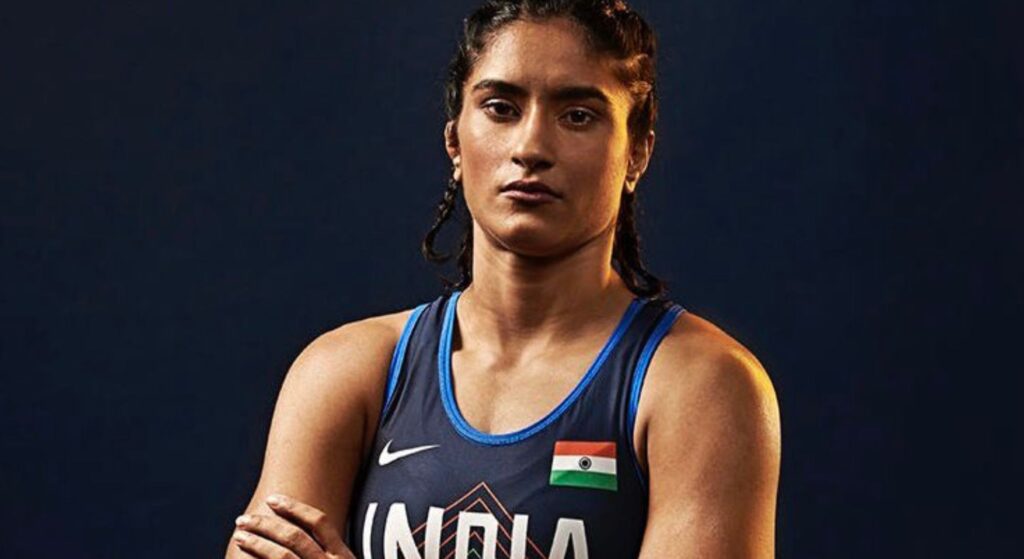The Weight of Dreams: Vinesh Phogat’s Fight Against the Scale
Vinesh Phogat was in the running to win an Olympic medal when her dreams were crushed on the morning of the final match. Phogat was competing in the 50kg category, which is three kgs below her usual competing weight. She toiled through the night to reduce the 2.7 kgs that she gained after playing multiple matches in a day. Jogging, running, following a whole exercise regime, staying on a strict diet, chopping off her hair, going to the sauna, and staying dehydrated weren’t enough for Phogat to make weight on the morning of the weigh-in, which disheartened her, the support team, and by extension–the nation.
Everyone is talking about Vinesh’s weight being 100 grams over the 50 kg category she participated in. A blame game seems fitting, but how we discuss women in fitness should not be detached from their body anatomy.
Women in sports: different from their male counterparts
Gaining weight throughout the day is a common experience for both men and women. However, even with Phogat’s support team at the Paris Olympics, there was uncertainty about how she gained 2.7 kg when the anticipated gain was only around 1.5kg. As she grappled with the trauma of disqualification, social media intensified the situation by comparing her to Aman Sehrawat, who lost 4.6kg in just 10 hours before his Olympic match. But is it fair to compare Phogat’s situation with Sehrawat’s weight loss journey?
To shed light on this, The Voices reached out to Mr Leslie Xavier, a former wrestler and senior journalist, to gain information regarding the pressures of gaining weight and their impact on athletes’ mental well-being. We also spoke with Dr. Madhulika Sharma, an MBBS and fitness enthusiast, about the challenges both men and women face in weight management and the medical implications of rapid weight loss.
“Generally, it is easier for men to lose weight quickly compared to women due to physiological and hormonal differences. Men have higher levels of testosterone, which enhances fat loss and promotes muscle gain, whereas women have estrogen, which can promote fat storage,” Dr Sharma explains.
Mr Leslie Xavier agreed with Dr Sharma but also made an important point: “Weight loss is a highly personal process. In Phogat’s case, it differs from that of other women in fitness. Phogat has a personal coach and nutritionist who creates programmes tailored for her needs, which most women in fitness do not have access to.”
Leslie also talked about his wrestling days when athletes didn’t have a sauna or other fancy equipment to help them cut weight. “We didn’t have a lot of equipment at our disposal. We used to wrap ourselves in blankets and wear layers of jackets to make weight, and even then also I’ve missed on qualification once by 50 grams. But in Vinesh’s case, she played three bouts back to back and what I believe is that her body refused to lose any more water because it went into survival mode. There has to be a period where you replenish yourself after the bouts, but that might not have worked in Vinesh’s favour because of the stress the body had already endured.”
Luxmi, a professional boxer and trainer at Cult, adds her perspective to what Mr. Leslie had said, and took the conversation further to talk about the impact of sudden weight loss on mental and physical health. She believes that strict weight loss, which is mostly sudden due to the taxing nature of the sport, impacts the mental health of the athlete most, as even the routine activities of hydration are capped. Running on minimal fuel during physically stressful matches is taxing on the body in every way. “Hormonal balances differ with and for every single body and even after her (Phogat’s) next level hard work, weight loss might just not have been on her side,” she adds.
Diet and Survival
Competing with a strict diet together with an intense workout regimen can be a delicate balance, affecting an athlete’s survival and performance. The energy needed by the body is of crucial importance, as a weakened state impairs focus and effectiveness. Adequate support is essential for athletes in such a demanding environment.
There is an urgent need to have more discussions about women in sports and fitness. Female athletes face different challenges compared to their male counterparts due to their physiological differences. The pressure to maintain weight can be particularly intense for women. “Muscle building puts additional pressure on female athletes to maintain certain aesthetic standards. This is affected by testosterone levels and menstrual cycle changes, making it generally more difficult due to lower muscle mass and higher body fat percentage,” explains Dr Sharma.
“Athletes weigh-in in the morning between 8 am to 8:30 am and then they have nutrition after that. Athletes usually carry one or two extra kgs when they enter bouts, but there are no rules that say that they have to add the weight to gain an advantage. It is the athlete’s call if he or she wants to carry that extra weight in a bout after the weigh-in. If a player wants to put on an extra load, it is a decision taken by the athlete and their management. Ideally, an athlete should manage a weight variation of no more than one kilogram,” Mr. Leslie concludes.
The debate over whether or not she should have competed in her previous weight category or whether she gave it her all distracts us from the fact that both men and women in sports face significant pressure to gain weight. Even with proper guidance and detailed preparation, athletes can still struggle with these challenges.
Copy edited by Nelson Mudaliar

